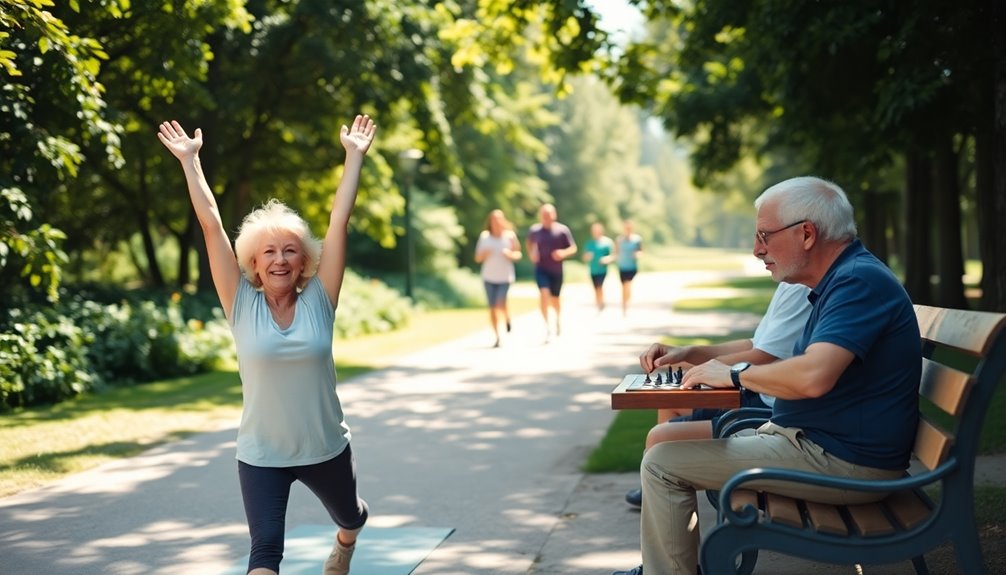Exercise is your secret weapon for enhancing brain power and reducing dementia risk. Engaging in regular physical activity boosts your brain's ability to process information and enhances communication between brain cells. Aim for at least 150 minutes of activity each week—walking is especially effective. This active lifestyle not only sharpens thinking skills but also fosters social connections, which are vital for mental well-being. Discover more ways to leverage exercise for your brain health and resilience.
Key Takeaways
- Regular exercise can reduce dementia risk by 30% to 80%, promoting overall brain health as we age.
- Physical activity enhances the brain's ability to process information and supports cognitive function through increased synaptic protein levels.
- Aiming for at least 150 minutes of activity weekly, especially walking, is crucial for maintaining memory and cognitive abilities.
- Engaging in social activities and playful communication during exercise boosts mental well-being and reduces feelings of isolation.
- Consistent physical movement fosters new nerve cell growth, which is essential for memory retention and sharper thinking skills.

When you think about staying healthy, exercise often comes to mind for your body, but it's just as crucial for your brain. Engaging in regular physical activity can be a game-changer for brain health, especially as you age. Research shows that exercise can reduce dementia risk by an impressive 30% to 80%, making it a vital component in maintaining cognitive function and overall mental well-being.
You might wonder how physical activity can have such a powerful impact on your brain. Studies indicate that higher levels of late-life physical activity are linked to increased synaptic protein levels, which are essential for effective communication between brain cells. This means that when you move, you're not just getting your heart pumping; you're also enhancing your brain's ability to process information and respond to challenges.
Aim for at least 150 minutes of physical activity per week, and you'll find activities like walking to be particularly beneficial in reducing the risk of cognitive decline.
Exercise isn't just about keeping your heart healthy; it also promotes the growth of new nerve cells. This is crucial for supporting cognitive function and improving memory retention. As you engage in regular exercise, you foster an environment where your brain can flourish, helping you maintain sharp thinking skills even as you grow older.
For older adults, especially those showing early markers of Alzheimer’s, staying active can provide protective effects, suggesting that exercise may play a role in mitigating cognitive decline. Engaging in regular physical activity not only boosts cardiovascular health but also enhances brain function through increased blood flow and neuroplasticity. This makes finding an effective exercise hack for Alzheimer’s prevention crucial for those concerned about cognitive decline. Incorporating activities like brisk walking, swimming, or even dancing into daily routines can significantly contribute to maintaining cognitive health as one ages.
Moreover, physical activity contributes to brain resilience. It helps your brain adapt and thrive, even in the face of potential challenges. By incorporating exercise into your daily routine, you're not only improving your physical health but actively working to fortify your mind against the effects of aging. Engaging in activities that promote social interaction can also enhance this effect, as seniors texting humor helps alleviate feelings of isolation and encourages playful communication.
This resilience is essential for preserving your cognitive abilities and enhancing your overall quality of life.
Conclusion
Incorporating exercise into your routine isn't just about physical fitness; it's a powerful way to boost your brain health too. By getting active, you're not only sharpening your mind but also building a shield against dementia. So, whether it's a brisk walk, a dance class, or lifting weights, find something you enjoy and make it a habit. Your brain will thank you now and in the years to come, keeping you sharp and vibrant throughout life.









